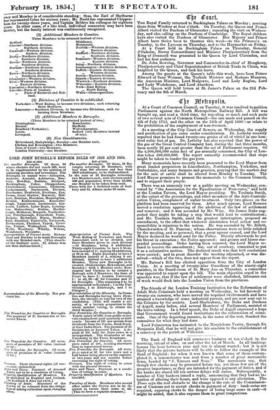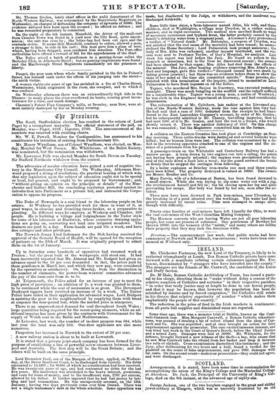'Ct 311ttropnli5.
At a Court of Common Council, on Tuesday, it was resolved to petition Parliament against the North Metropolitan Railway Bill. A bill was brought up, and read a third time, for repealing so much and such parts of two several acts of Common Council—the one made and passed on the 4th of July 1712, and the other on the 15th of April 1606—as relate to the prohibition of the employment of non-freemen.
At a meeting of the City Court of Sewers, on Wednesday, the supply and purification of gas came under consideration. Dr. Letheby recently reported that he had found twenty-one grains of oil of vitriol in one hun- dred cubic feet of gas. Dr. Letheby has also reported that the power of the gas of the Great Central Company had, during tho last three months, been nearly 22 per cent greater than the net of Parliament requires. Of the 4,000,000,000 cubic feet of gas annually consumed, the City of Lon- don takes 500,000,000. The report earnestly recommended that steps might be taken to render the gas pure.
Many memorials have recently been presented to the Lord Mayor from great landed proprietors in Lincolnshire, Northampton, Yorkshire, and Oxfordshire, and many farmers and graziers, praying that the market-day for the sale of cattle shall be altered from Monday to Tuesday. The Lord Mayor promises to present the memorials to the Common Council, and to support their prayer.
There was an unseemly row at a public meeting on Wednesday, con- vened by "the Association for the Equalization of Poor-rates," and held at the London Tavern, the Lord Mayor presiding. Mr. Toulmin Smith, at the outset of the proceedings, and other members of the Anti-Centrali- zation Union complained of unfair treatment. Only two places on the
platform had reserved for them. After much uproar, Lord Berners moved a resolution approving of the abolition of the law of settlement and removal; and it was seconded by Mr. Wise. Sir James Duke sug- gested they might be taking a step that would lead to centralization; and Mr. 'foulmin Smith, amid the greatest interruption, proposed an amendment, to the effect that whatever diminishes local action and re- sponsibility is injurious to the nation. He was seconded by Mr. Billett, Churchwarden of St. Pancras; whose observations were so little relished by the meeting, and so personal, that a great uproar ensued, and the Lord Mayor declared he would send for the Police. Shortly afterwards he put his threat in execution ; the Police appeared; and groans and hisses sus- pended proceedings. Order having been restored, the Lord Mayor re- fused to receive the amendment; but, out of courtesy, consented to put it as a substantive motion. The declared result was that both resolutions were carried; and in great disorder the meeting adjourned, or was dis- solved—which of the two, does not appear from the report.
Mr. Baines's Bill has elicited opposition from the City of London Union. At a meeting of twenty-nine Guardians of the ninety-eight parishes, in the Board-room of St. Mari Axe on Thursday, a committee was appointed to report upon the bill. The main objection urged in the speeches was, that if the law of settlement were abolished, labourers out of work would flock into the London Union front the provinces.
The friends of the London Training Institution for the Reformation of Adult Male Criminals held a meeting on Wednesday, to bid farewell to twenty-six inmates, who have served the required twelvemonth and have attained a knowledge of some industrial pursuit, and are now sent out to the Colonies by the society. Lord Shaftesbury, the Duke and Duchess of Argyll, many ladies, and several Members of Parliament, assisted at the leave-taking. In a brief speech, the Duke of Argyll expressed a hope that Government would found institutions for the reformation of crimi- nals. One of the departing inmates, in the name of the rest, thanked the committee for what they had done.
Lord Palmerston has intimated to the Marylebone Vestry, through Sir Benjamin Hall, that he will not give his sanction to the establishment of a cemetery in the parish of Willesden.
The Bank of England will commence business at ten o'clock in the morning, intead of nine, on and after the 1st of March. In all banking- houses the hour between nine and ten is almost wasted; but it is not likely that the private bankers will be able to follow the example of the Bank of England ; for when it was known that some of them contem- plated it, a remonstrance was sent from a number of great mercantile firms, headed by "3. Travers and Sons." The merchants say, that though few checks may be presented before ten, yet those few are of the greatest importance, as they are intended for the payment of duties, and if the banks are closed till ten serious delays will ensue. Subsequently, a number of City bankers issued a reply, announcing that they had no in- tention of altering their hours, and were opposed to any alteration. The limes says the real obstacle to the change is the rule of the Commission- ers of Customs not to accept checks in payment of duty : bank-notes are required, exposing clerks to the danger of losing large sums in cash—it might be added, that it also exposes them to great temptations.
Mr. Thomas Goalen, lately chief officer in the audit department of the North-Western Railway, was reexamined by the Marylebone Magistrate on Wednesday, on charges of defrauding the company of upwards of 35004 The evidence adduced bore hard upon the accused ; he offered no defence ; and he was remanded preparatory to committal. On the night of the 4th instant., Mansfield, the driver of the mail-cart from Camden Town was found in a yard near the City Road, quite uncon- scious; the cart was close by ; the letter-bag had been cut open and the contents stolen. It seems that Mansfield, contrary to orders, allowed a man, a stranmr to him, to ride in his cart ; this man gave him a glass of beer, which,laving been drugged, soon rendered him senseless. The Post-office authorities have offered a reward of 501. for the apprehension of the thief. The Police seized a batch of gentlemen in a gaming-house called the Berkeley Club, in Albemarle Street ; but no gaming-implements were found ; and the Marlborough Street Magistrate immediately set the prisoners at liberty.
Pouget, the poor man whose whole family perished in the fire in Prince's Street, has himself sunk under the effects of his jumping into the street— the ninth victim.
A woman eighty-six years of age has perished in a fire at Charles Street, Westminster, which originated in the roomk she occupied, and to which it was confined.
On Wednesday aftenioon there was an extraordinarily high tide in the Thames: in many places the river overflowed its banks, causing great incon- venience for a time, and much damage.
Claussen's Patent Flax Company's mills, at Bromley, near Bow, were al- most entirely destroyed by fire on Monday evening.

































 Previous page
Previous page